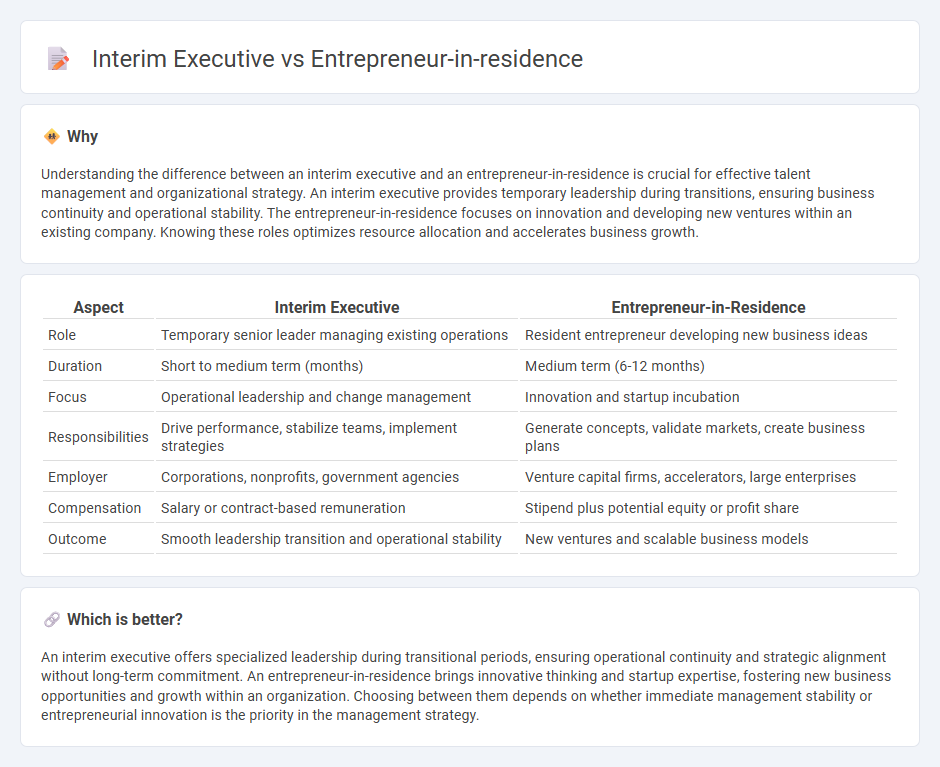
Interim executives deliver specialized leadership during transitional periods, focusing on stabilizing and optimizing existing operations with proven management expertise. Entrepreneurs-in-residence drive innovation by leveraging entrepreneurial skills to develop new ventures or business models within an organization. Explore the distinct advantages and roles of interim executives and entrepreneurs-in-residence to enhance organizational growth.
Why it is important
Understanding the difference between an interim executive and an entrepreneur-in-residence is crucial for effective talent management and organizational strategy. An interim executive provides temporary leadership during transitions, ensuring business continuity and operational stability. The entrepreneur-in-residence focuses on innovation and developing new ventures within an existing company. Knowing these roles optimizes resource allocation and accelerates business growth.
Comparison Table
| Aspect | Interim Executive | Entrepreneur-in-Residence |
|---|---|---|
| Role | Temporary senior leader managing existing operations | Resident entrepreneur developing new business ideas |
| Duration | Short to medium term (months) | Medium term (6-12 months) |
| Focus | Operational leadership and change management | Innovation and startup incubation |
| Responsibilities | Drive performance, stabilize teams, implement strategies | Generate concepts, validate markets, create business plans |
| Employer | Corporations, nonprofits, government agencies | Venture capital firms, accelerators, large enterprises |
| Compensation | Salary or contract-based remuneration | Stipend plus potential equity or profit share |
| Outcome | Smooth leadership transition and operational stability | New ventures and scalable business models |
Which is better?
An interim executive offers specialized leadership during transitional periods, ensuring operational continuity and strategic alignment without long-term commitment. An entrepreneur-in-residence brings innovative thinking and startup expertise, fostering new business opportunities and growth within an organization. Choosing between them depends on whether immediate management stability or entrepreneurial innovation is the priority in the management strategy.
Connection
Interim executives provide temporary leadership during organizational transitions, leveraging extensive management expertise to maintain operational stability. Entrepreneurs-in-residence cultivate innovation within companies or investment firms by developing new ideas and business models. Both roles emphasize strategic agility and leadership, facilitating growth and change in dynamic business environments.
Key Terms
Temporary Leadership
An entrepreneur-in-residence (EIR) typically brings innovative startup expertise to a company for a limited period, focusing on launching new ventures or driving strategic initiatives. Interim executives, on the other hand, assume temporary leadership roles to manage transitions, crises, or executive vacancies within established organizations. Explore the distinct benefits and roles of these temporary leadership positions to understand which suits your business needs.
Strategic Guidance
Entrepreneur-in-residence (EIR) roles prioritize innovation and startup expertise to provide strategic guidance focused on growth opportunities and disruptive market trends. Interim executives concentrate on operational leadership, driving immediate organizational performance and managing transitions during periods of change. Explore how each role can strategically benefit your business's unique needs.
Organizational Transition
An Entrepreneur-in-Residence (EIR) drives innovation and strategic growth during organizational transitions by identifying new business opportunities and incubating projects within the company. An Interim Executive provides leadership continuity, managing operational challenges and stabilizing the organization while permanent leaders are sought or during restructuring phases. Explore how each role uniquely supports seamless organizational transition and long-term success.
Source and External Links
What is an entrepreneur in residence (EIR) - An entrepreneur in residence is an experienced professional who helps startups or venture capital firms identify and capitalize on new business opportunities by providing expertise and mentorship.
Entrepreneur in residence - Wikipedia - An entrepreneur in residence is a position held by successful entrepreneurs in venture capital firms, private equity firms, and other organizations, where they leverage their expertise to assist portfolio companies and evaluate new investment opportunities.
What Is an Entrepreneur in Residence? Definition and Duties - An entrepreneur in residence is a temporary role where the individual provides a company with their expertise in exchange for support for their future endeavors, often involving investment advice or startup guidance.
 dowidth.com
dowidth.com